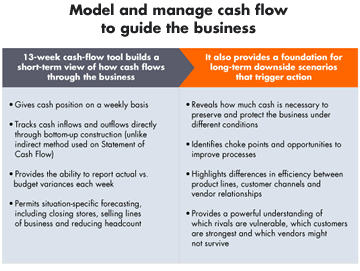Harvard Business Review
Until recently, most senior executives regarded managing cash flow and liquidity as tactical functions, a mundane set of activities left to administrative managers. No more. As the global financial crisis has choked off credit, cash management has become strategic. Companies with weak operating cash flows are finding it more difficult to secure outside funding, just when flows are harder than ever to generate.
The resulting cash pinch can threaten the largest global players. General Motors and Chrysler would have succumbed without government help. Circuit City wasn't so lucky. Conversely, companies that aggressively manage cash and liquidity—and use the perspective and the data that come with it to gain forward visibility—have opportunities to prosper in turbulence.
Wal-Mart, for instance, is aggressively managing resources to take advantage of others' weakness. The company has cut capital expenditures, halted a stock buyback program and trimmed inventories. It has shifted cash from opening new stores to remodeling existing ones. That has allowed Wal-Mart to keep cutting prices.
A critical first step in such cash-flow discipline is adopting a 13-week tool that shows what's flowing into and out of each business segment on a weekly and monthly basis. The idea is to capture real-time information on flows and compare them with budgeted amounts. Persistent variances signal fast-emerging problems in product lines, customer channels and vendor relations problems that can be addressed before it is too late.
View the larger version of this chart
Many senior executives have also begun to model downside scenarios informed by cash flow and liquidity measures. These can accurately show how much cash they need to protect the business under different conditions. Turned outward, they can also provide powerful insights into which rivals are vulnerable, which customers are strongest and which vendors might not survive.
The value of this approach builds with time. Consider how one auto-rental company used this process in the last economic downturn. Contractually obligated to take billions of dollars worth of cars from automakers, it developed a detailed understanding of the working capital implications for each class of car rented out in every conceivable situation.
Right away, the data showed that management had several available levers to pull to save cash and shore up operations if business conditions worsened. One of them involved the company's preferred customer desk, an amenity allowing top customers to pick any car for a set price. From a marketing standpoint, the desk was a big win. But from a cash flow perspective, it was a nightmare.
Yet, by understanding the behavior of their most lucrative business customers—and knowing the cash cycle of each class of automobile—managers could offer top choices only at the most important locations. The scenario anticipated that some customers would leave, but it also freed up $200 million to $300 million to invest elsewhere.
To learn more, read the full article, which shows how other leading global companies are "following the cash" in similar ways, and honing their downturn strategies.
Darrell Rigby is a Boston-based partner at Bain & Company and leads the firm's Global Retail practice. David Sweig is a Bain partner in Chicago and a leader in Bain's Corporate Renewal Group.
